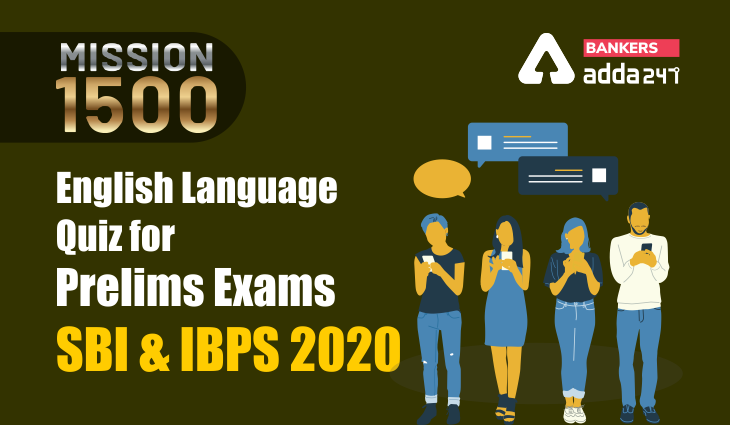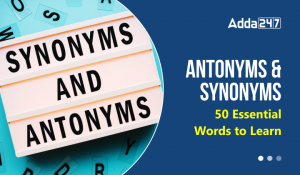
the error, if any. If there is no error, the answer is (e), i.e. No error.
(Ignore the errors of punctuation, if any.)
Q1. The road from the (a)/ river bank to the hut (b)/ was more
difficult than (c)/ we have feared. (d)/ No error (e).
Q2. I found that (a)/ I had had the (b)/ hardest time in writing
dialogues (c)/ for elderly people. (d)/No error (e).
Q3. During the course of the exhibition, (a)/ the old man who was
(b)/ looking cheerful (c)/ kept on take notes. (d)/No error (e).
Q4. Unable to decide (a)/ what to do, (b)/ he stared at the
fountain (c)/ at the centre of the park. (d)/ No error (e).
Q5. The bank employees could remember John (a)/ as he has been
maintained (b)/ his account with the bank (c)/ for the last ten years. (d)/No
error (e).
Directions (6-10):
Rearrange the following five sentences (A), (B), (C), (D), and (E) in the
proper sequence to form a meaningful paragraph and then answer the questions
given below.
(A) The
working group had examined fair-practice codes adopted by bankers in other
domains like UK, Canada, Hong Kong, Singapore and Australia and prepared a
draft Banker’s Fair Practice Code, duly incorporating some of the finer points
from those documents.
(B) The
RBI, while announcing the formation of the Banking Codes and standards Board of
India (BCSBI) in the annual Policy Statement, had requested the IBA to set up a
working group to draft a comprehensive fair practice code, covering all the
areas of customer service for uniform adoption by banks.
(C) BCSBI
made further refinements to the code and the Code of Bank’s Commitment to
Customers was brought out.
(D) Accordingly,
the IBA had set up a working group to study the international practices and
review the existing codes.
(E) It
further refined the draft code, incorporating the suggestions from the member
banks and submitted it to the BCSBI.
Q6. Which of the following should be the
FIRST sentence after rearrangement?
(a) A
(b)E
(c) C
(d)B
(e) D
Q7. Which of the following should be the
SECOND sentence after rearrangement?
(a) D
(b)A
(c) B
(d)E
(e) C
Q8. Which of the following should be the
THIRD sentence after rearrangement?
(a) C
(b)D
(c) B
(d)E
(e) A
Q9. Which of the following should be the
LAST (FIFTH) sentence after rearrangement?
(a) B
(b)C
(c) A
(d)D
(e) E
Q10. Which of the following should be
the FOURTH sentence after rearrangement?
(a) A
(b)B
(c) E
(d)C
(e) D
Directions (11-15):
In the following passage, some of the words have been left out, each of which
is indicated by a number. Find the suitable word from the options given against
each number and fill up the blanks with appropriate words to make the paragraph
meaningfully complete.
Bank
customers may no (11) have to maintain a minimum balance in their
saving account as the Reserve Bank of India has directed. Banks to do away
with. the practice of levying penalty on account holders who don’t do so. While
this spells good news for account holders, some bankers said this would
increase their (12) and they might start charging for some of the
services they were offering free.
“I
think what they are saying is, if you don’t charge on (13) minimum
balance then you are authorized to charge on the transaction,” said HDFC Bank’s
managing director Aditya Puri.
For
instance, if a customer has a balance of less than Rs. 10000 in the savings
account, the bank may not charge for non-maintenance of minimum balance, but
could (14) charge for more than two ATM transactions a month.
RBI
has urged banks to limit the liability of customers in cases like
non-maintenance of balance or electronic transactions where banks are not able to (15) customer
negligence.
Q11. (a) where
(b) one
(c) money
(d)body
(e) longer
Q12. (a) prices
(b)assets
(c) incomes
(d)costs
(e) rates
Q13. (a) maintaining
(b)putting
(c) placing
(d)transacting
(e) ascertaining
Q14. (a) in spite of
(b) although
(c) instead
(d) despite of
(e) not
Q15. (a) accuse
(b) show
(c) condone
(d) prove
(e) counter
SOLUTIONS:
S1. Ans.(d)
Sol. As the sentence is in the past tense, ‘have’ should
be replaced with ‘had’.
S2. Ans.(e)
Sol. No error.
S3. Ans.(d)
Sol. Only the gerundial form of verb (V+Ing) is used
after a preposition, so use ‘taking’ in place of ‘take’
S4. Ans.(e)
Sol. No error.
S5. Ans.(b)
Sol. When ‘been + Verb’ is followed by an object, the
verb is used with ‘-ing’ and in this sentence ‘his account’ is the object, so
we should use ‘maintaining’ in place of ‘maintained’
S6. Ans. (d)
Sol. The proper sequence of sentences to form a
meaningful paragraph will be
BDAEC
S7. Ans. (a)
Sol. The proper sequence of sentences to form a
meaningful paragraph will be
BDAEC
S8. Ans. (e)
Sol. The proper sequence of sentences to form a
meaningful paragraph will be
BDAEC
S9. Ans. (b)
Sol. The proper sequence of sentences to form a
meaningful paragraph will be
BDAEC
S10. Ans. (c)
Sol. The proper sequence of sentences to form a
meaningful paragraph will be
BDAEC
S11. (e)
S12. (d)
S13. (a)
S14. (c)
S15. (d)
Practice with Crash Course and Online Test Series for IBPS Mains 2020:
- IBPS RRB PO and Clerk Prime 2020-21 Online Test Series
- IBPS PO Online test series (Prelims + Mains) 2020 by Adda247
- IBPS KA MAHAPACK Online Live Classes
Click Here to Register for Bank Exams 2020 Preparation Material
Practice with Crash Course and Online Test Series for IBPS Clerk Prelims:



 English Language Notes for Competitive E...
English Language Notes for Competitive E...










